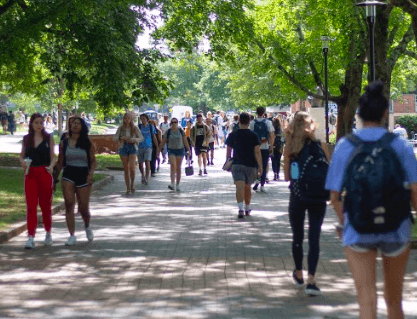URI’s 2018 Clery report data shows little change in the crime frequency on campus. Photo by Grace DeSanti.
The report is released every year and is required for all federally funded universities
The University of Rhode Island’s police department and department of public safety released the statistics of all reportable crimes from 2018 on the University’s five campuses on Oct. 1 to the public.
This document is known as the Clery Report, which is an extensive list of fire statistics and reportable crimes. Reportable crimes include things like instances of violence against women, hate crimes or drug, alcohol and weapons arrests. The report is in compliance with the Jeanne Clery Disclosure of Campus Security and Crime Statistics Act, any University that accepts federal funds must produce the report.
Lieutenant Paul Ricci at URI’s police department said that beyond the report being mandated, the community deserves to know the statistics in their area.
“I think it’s important that as a law enforcement agency, and as a college, that we are transparent with the community so they know what types of crimes have happened here,” said Ricci. “We also want people to have the knowledge so they can make an informed decision as to whether they want to choose this campus.”
Crime on Kingston’s campus went down 12 percent in 2018, the previous year, crime went down 4.4 percent.
In 2018, there were 13 reported instances of rape in residence halls and 15 in total on the Kingston campus. The number of rapes reported in residence halls increased in 2018 by four and stayed the same on campus overall. There were also two reports of fondling on campus, two reports of aggravated assault and 10 reports of burglary.
The number of domestic violence reports decreased from 11 in 2017 to one report in 2018. There were also four reports of dating violence and two reports of stalking.
Stephen Baker, director of Public Safety and the Chief of the URI police said that he’d really like to see the instances of sexual crimes at zero.
“As far as sexual assault goes, we know a lot does not get reported,” said Baker. “‘I’d like to think it’s not that they have a fear of police or the people in this institution, because the main thing is that we want our students to know that this institution takes that offense very seriously.”
Baker said his office works very hard to make sure any student who comes in to report something feels safe and welcomed.
“There’s always been a stigma involved with that crime,” said Baker. “It’s a personal decision and I’m sure a very tough one for that person [to make].”
Baker also said that his office has been in partnership with South Kingstown Police, Narragansett Police and Rhode Island State Police so that if something happens to a URI student, they can find out and make sure they get the right resources.
There were 489 alcohol referrals, two drug referrals and three weapon referrals on campus in 2018. However, there were only six alcohol arrests, 12 drug arrests and three weapons arrests. The number of drug arrests increased by seven from 2017 to 2018. Baker says that this doesn’t necessarily mean there are more instances, just more reports.
“I think that’s mainly attributed to our officers who are out there making car stops and looking for suspicious activity,” said Baker. “Usually, it’s the people selling or intent to sell drugs. Even though its a higher number, it’s a positive that we’re making those arrests and taking care of those situations.”
The Clery Report showed no statistics of hate crimes. However, to be considered a hate crime, the police would have to prove that an offense was directed at somebody personally. If the police don’t find the person who did it, they can’t prove any intent of a hate crime.
Ricci said that he’d like to see the number of violent crimes go down as well.
“Any crimes of violence, we have no tolerance for it,” said Ricci. “We’d like to see the numbers go down, we try to do this through education, through partnering with the community and throughout our presence in patrol.”
Ricci knows that some people will always have an intent to commit a violent crime, but he hopes that their presence around campus deters them from doing so.
“We get the feeling we’re making an impact and making the campus safer as we’re working with the community,” said Baker. “We hope they feel safer, but if they don’t we need to know what we need to do.”

